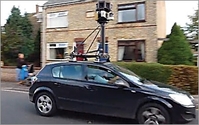Supreme Court Rejects Google Appeal In WiFi Snooping Case
- by Wendy Davis @wendyndavis, June 30, 2014
 The Supreme Court has refused to hear Google's appeal of a ruling allowing consumers to proceed with a privacy lawsuit stemming from the Street View snooping
scandal.
The Supreme Court has refused to hear Google's appeal of a ruling allowing consumers to proceed with a privacy lawsuit stemming from the Street View snooping
scandal.
The court's order, issued on Monday, lets stand an appellate decision that Google potentially violated the federal wiretap law by collecting “payload” data -- including emails, passwords and URLs visited -- from unencrypted WiFi networks. The Supreme Court didn't give a reason for its decision.
The legal proceedings date to 2010, when it came to light that Google's Street View cars collected a trove of data from WiFi networks that weren't password-protected. The company apologized and said that it intended to destroy the data, but the so-called “Wi-Spy” revelations still prompted a class-action lawsuit against the company -- as well as investigations by government agencies in the U.S. and abroad.
Google contends that it didn't violate the wiretap law, due to the wording of the federal wiretap law. While the law bans the interception of radio and electronic communications, it also has an exception for radio communications that are “readily accessible” to the public.
The search company argued that it met the requirements for that exception, given that it only captured data from unsecured networks. A trial judge ruled against Google on that point, as did the 9th Circuit Court of Appeals. The appellate court specifically ruled that WiFi transmissions are not “radio communications,” which it defined as predominantly auditory broadcasts.
In April, Google asked the Supreme Court to hear the case, arguing that the appellate court's reasoning is outdated. “In the world of Internet protocol communications, a bit of data is simply a bit of data,” Google argued in its petition for review.
The think tank Information Technology & Innovation Foundation supported Google's request for an appeal. That group argued in a friend-of-the-court brief that intercepting unsecured WiFi transmissions should not violate federal privacy law.
For Google, the class-action lawsuit marks the only remaining unfinished business in the U.S. stemming from the incident. The Federal Trade Commission closed its investigation without taking action. The Federal Communications Commission, which also looked into the allegations, fined Google $25,000 in 2012 for refusing to cooperate with the investigation.


